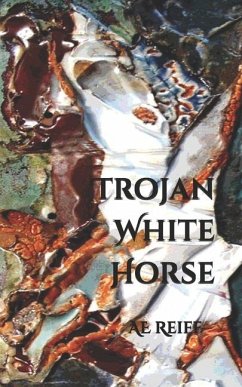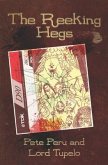An ambitious, layered exploration of how ancient myths resonate with contemporary issues, particularly of technology, power, and identity. Mythic and literary devices critique the digital age impact on human society, suggesting that in some ways we are living out ancient narratives in new forms, with technology as both the protagonist and antagonist. An exploration of technology, history, mythology, and power structures woven together from various mythologies (Greek, Roman, Christian) with modern technological concepts like AI, data centers, and digital surveillance. The Trojan Horse becomes a symbol not just of deceit but of how digital technologies infiltrate and alter societal structures, much like the original horse was used to infiltrate Troy. The imagery of the centaur president, combining the human with the animal (or in this case, the digital), reflects on leadership in a modern context where human decision-making is intertwined with AI or data-driven processes. This fusion suggests a loss of autonomy or purity in governance, akin to how myths often used hybrid creatures to explore moral or ethical dilemmas. Parallels are drawn between historical constructions like the Tower of Babel and Kafka's Great Wall with contemporary structures like the digital infrastructure (4G, 5G, etc.), suggesting a cyclical pattern where human ambition to connect or control leads to both creation and destruction. The transformation of geographical features into mythological entities, like the nation as a bull or cow, illustrates a critique of national identities or empires as performative or sacrificial in their quests for power, echoing ancient rituals like the taurobolium. The Reality Perception of this Wittgenstein and Russell's philosophical debate about certainty and the presence of the unseen (the rhinoceros) metaphorically extends to the hidden algorithms and data systems that govern lives without full awareness, a critique of how we perceive reality in an age so much mediated by technology. The use of "ekphrasis" here serves as a literary device to describe scenes or artworks in such vivid detail that they become a reality in the reader's mind, paralleling how digital data constructs our perceived reality and the loss of individual agency in a world where data is king. The imagery of the Trojan Horse filled with digital agents rather than soldiers reflects how modern forms of conquest or influence might succeed. Gobal cultures and their transformations of nations like Canada and Australia underline how traditional values and identities are reshaped by digital imperialism. In a translation of one dimension to another unlikely logic persists. In this case a horse is a house. The Trojan Horse was indeed a house. It housed a company of Greeks in its belly who brought about the downfall of the city of Troy when the horse was transported inside the gates. That night, during the Trojan victory celebration, the Greeks crept out and burned the city to the ground. So a horse was a house. Translated into the other dimension of what used to be called time, before modern timelessness began, a house became a horse, which to apply the logic, the White House of the American executive carried within itself the forces of betrayal that burned the nation to the ground. Any time we go to another dimension however relations double, so not only did the house become a horse destroy the nation, it did so in such a way that the nation was exalted to a Higher status. On that higher plane the power of that nation increased beyond expectation. Seventh Day Adventist Ellen White addressed aspects of this fetish directly, but her writings are never part of the end time podcasts. The White House Horse therefore became a a prophetic White house Horse of the first seal of Revelation.
Hinweis: Dieser Artikel kann nur an eine deutsche Lieferadresse ausgeliefert werden.
Hinweis: Dieser Artikel kann nur an eine deutsche Lieferadresse ausgeliefert werden.








